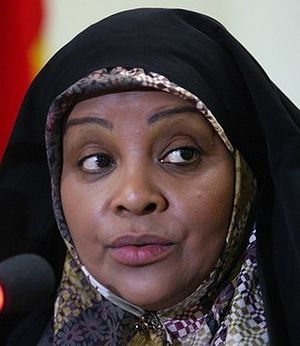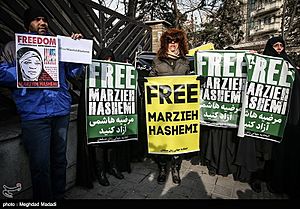Marzieh Hashemi facts for kids
Quick facts for kids
Marzieh Hashemi
|
|
|---|---|
 |
|
| Born |
Melanie Franklin
December 21, 1959 |
| Citizenship | United States Iran |
| Occupation | Journalist |
| Known for | Press TV host |
Marzieh Hashemi (Persian: مرضیه هاشمی), whose birth name was Melanie Franklin, is an American-born Iranian journalist and television presenter. She is a citizen of both the United States and Iran. Marzieh Hashemi works for Press TV, which is a news and documentary TV network owned by the Iranian government.
In January 2019, Hashemi was arrested by the FBI while traveling to visit her children. She was held as a witness in a federal investigation, meaning she was not accused of a crime herself. She was released on January 23, 2019, after giving her testimony.
Contents
About Marzieh Hashemi
Marzieh Hashemi was born on December 21, 1959, in New Orleans, Louisiana, in the United States. She grew up in a Christian African-American family. In 1979, she was studying broadcasting when the Iranian revolution took place.
This event led her to become a Muslim. After converting, she started her career working for Islamic newspapers and magazines in the United States.
Life in Iran
Since 2008, Marzieh Hashemi has lived in Iran. There, she works as a TV presenter, journalist, and voice-over artist. She also creates documentaries and hosts shows for Press TV, which is Iran's English-language news channel.
She has shared that the Iranian Revolution and the teachings of Ayatollah Khomeini were important reasons for her conversion to Islam. She felt she was searching for truth and found answers in Islam that she hadn't found in her previous religion. She studied different religions before deciding to become a Muslim.
Her Name Change
After she converted to Islam, Melanie Franklin changed her name to Marzieh Hashemi. Hashemi is the last name of her Muslim husband. She chose the name Marzieh because it is a title for Fatimah bint Muhammad, who was the daughter of the Islamic prophet Muhammad. She was given Iranian citizenship because her husband is Iranian.
Her Arrest in the United States (2019)
On January 13, 2019, Marzieh Hashemi traveled to the United States. She went to visit her family, especially her brother who was ill. She was also planning to film a documentary about Black Lives Matter for Press TV.
Federal agents arrested Hashemi at the St. Louis Lambert International Airport in Missouri. She was then held in custody in Washington D.C. At first, the reason for her arrest was not clear. Later, court documents showed she was being held as a "material witness" for a federal investigation. This means she was needed to provide information, but she was not accused of any crime herself.
Some reports suggested that a grand jury was looking into whether Press TV needed to register as a foreign agent in the U.S. This registration is required if a media outlet is seen as a propaganda tool for a foreign government. After giving her testimony to a federal grand jury, Marzieh Hashemi was released on January 23, 2019. She returned to Iran on January 30, 2019.
Treatment During Detention
Iranian media reported that Hashemi was not allowed to call her family for 48 hours after her arrest. Press TV also stated that she was denied halal food, which is food prepared according to Islamic law. They said she was only offered pork, which Muslims do not eat. Because of this, she reportedly only ate a packet of crackers during her detention.
Hashemi also said that her hijab, a head covering worn by Muslim women, was forcibly removed. She was only allowed to wear a short-sleeved shirt, which goes against the requirements of her Muslim faith. Marzieh Hashemi had previously spoken out against discrimination faced by veiled Muslim women in the U.S.
Reactions to Her Arrest
Many people and groups reacted to Marzieh Hashemi's arrest:
- Iran's Foreign Minister, Mohammad Javad Zarif, called her arrest a "political game." He said it was an unacceptable political act that went against freedom of speech.
- Peyman Jebelli, who leads the World Service of Iran's state broadcasting, called the arrest a "blunder." He also criticized how she was treated while in U.S. custody.
- The Islamic Human Rights Commission (IHRC) wrote to the UN about her imprisonment. The IHRC spoke out against her arrest and asked for a wide media campaign to help get her released.


